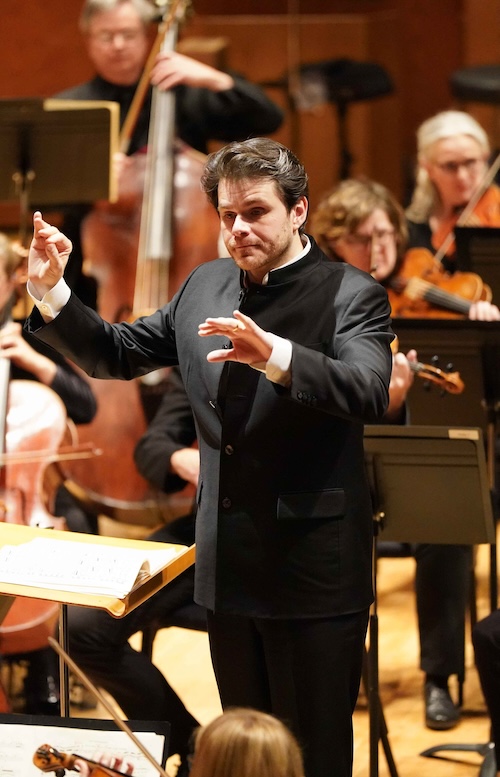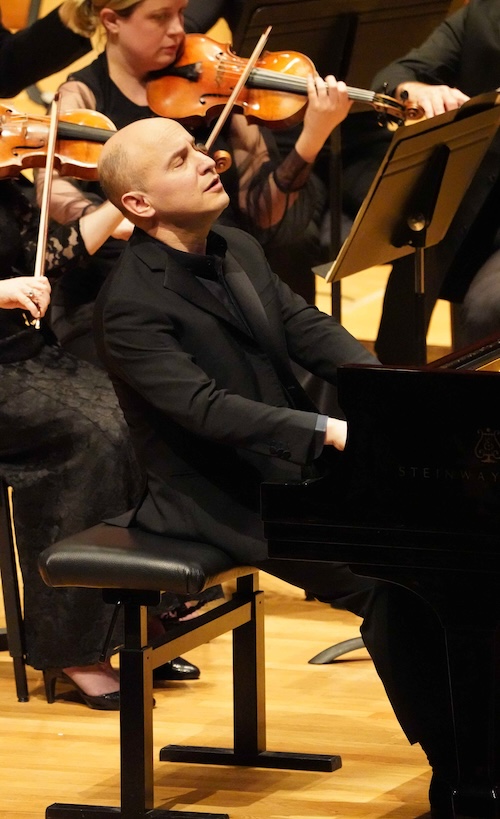Classical Music
Adkins shines with Adams in Utah Symphony’s American program
David Robertson, the Utah Symphony’s creative partner, led the orchestra in […]
Hough returns to Utah Symphony with impassioned Rachmaninoff
Sir Stephen Hough is no stranger to Utah Symphony concertgoers. The […]
Theater
Critic’s Choice 2025-26
Moravec: The Shining. Utah Opera. October 11–19. Stephen King’s horror classic […]
Concert review
A pair of Utah Symphony debuts deliver vibrant Mendelssohn, Debussy

This weekend, two newcomers to the Abravanel Hall stage made impressive Utah Symphony debuts. On Friday evening, pianist Nelson Goerner gave an electrifying reading of Mendelssohn’s Piano Concerto No. 1, and conductor Nicholas Carter led the orchestra in a vibrant account of Debussy’s La mer.
Mendelssohn’s brief 20-minute concerto opens with fiery, romantic passion. The Argentinean-born pianist put on a fine display of his technical mastery, playing the bravura passages with flair.
The same held true in the closing Presto. But whereas the music in the opening movement is notable for its darkly tinged drama, the finale is filled with unbridled joy and exuberance. Goerner gave a dynamic reading that emphasized the youthful vitality of the music with his virtuosic playing.
The middle movement offered contrast with its simply expressed melodies. Goerner captured the lyrical character of the music with his graceful playing, and Carter elicited subtle and sensitive playing from the ensemble.

Throughout the concerto Carter offered a well-balanced accompaniment that supported the soloist and let him seize the spotlight. Carter mirrored Goerner’s approach with robust direction that had the orchestra playing with crisp articulation and spirited vigor.
In the second half of the program, the Australian-born conductor gave a picturesque reading of La mer, one of Debussy’s most frequently played works. of the most remarkable maritime-themed compositions in the repertoire.
Carter’s account underscored the seamless, billowy flow of the music with his perceptive direction. In the opening movement, “From Dawn to Noon on the Sea,” Carter captured the restless drive of the music, getting the orchestra to play with nuanced expression and finely tuned lyricism. That carried over into the following “Play of the Waves,” with Carter emphasizing the sudden shifts in dynamics and delivery with precise clarity.
In the closing “Dialogue of the Wind and the Sea,” the conductor coaxed a full-bodied sound from the strings and robust playing from every section of the orchestra, captureing the explosive vitality of the music with his bold direction and dramatic gestures.
Before La mer, Carter led the orchestra in Debussy’s early and delightful Petite Suite. Originally written for piano four hands, Debussy later had his fellow composer Henri Büsser orchestrate it. Carter conveyed the carefree character of each of the four short movements, and the orchestra played with captivating lightheartedness.
The concert opened with a Utah Symphony premiere: Arnold Bax’s atmospheric tone poem Tintagel. Inspired by a trip to Cornwall, Bax’s piece is an evocative depiction of the area’s wind-swept coastline. Carter conveyed the rich harmonic palette of the music in this expansive reading, and the orchestra was fully in synch with the sweeping lines and outdoor breadth of the score.
The program will be repeated 7:30 p.m. Saturday. utahsymphony.org
Calendar
March 7
Utah Opera
Donizetti: The Elixir of Love
Daniel O’Hearn, […]
Dance
Ballet West creates a moving and magical Neverland in “Peter Pan” premiere
Ballet West escaped to Neverland Friday night with the opening of […]
Ballet West’s “Nutcracker” works its holiday magic once again
Ballet West kicked off the holiday season with (surprise!) The Nutcracker […]

